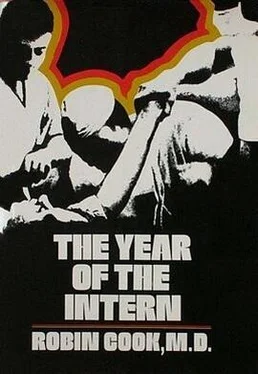As I walked into the room, my dismay was instantly confirmed by the sight of a lady in her late forties who was wearing a light blue negligee. She lay on the table, one hand pressed dramatically against her ample upper chest. Two other ladies stood nearby hysterically telling me and the nurse that their friend was unable to breathe. I could see from a distance that the lady was breathing very easily.
“Oh, Doctor,” the lady whined, drawing out the word in a deep southern accent. “I cain’t hardly breathe. You have to help me.”
She smelled like week-old martinis. One of the hysterical ladies produced a prescription bottle. I looked at it. Seconal.
“Oh, those little red pills. I did take two. Was that all right?” The southern lady looked at me with fluttery eyelids; she was having a hell of a good time at two o’clock in the morning. I had a strong impulse to throw her neurotic ass out of the ER. That was a sure administrative bomb, however — perhaps even career suicide. Despite my disenchantment with the system, I hadn’t come to that.
“Do you hear anything strange, Doctor?” I was forcing myself to listen to her chest, which was totally clear. “Oh, you’re going to take my temperature and blood pressure,” she said gleefully. “I do feel rather faint. I just cain’t understand what’s happening to me.” On her arm went the blood-pressure cuff and into her mouth the thermometer, silencing her at last. I was glad of the opportunity to get away from her for a few minutes by calling the doctor who covered the hotel where she was staying. He said to give her Librium.
Back in her presence, I coaxed myself to be civil. “Madam, the hotel physician has suggested Librium for you.”
“Librium, Doctor? Are those the little green and black pills? Well, I’m afraid I’m allergic to those. They make me so gassy, and sometimes,” she said, sitting up now, moving into high gear, “sometimes if s so bad my hemorrhoids pop out.” With this, we were fully launched into her extensive pill history and the dreadful details of her lower gastrointestinal tract. In the middle of her recital, a performance worthy of Blanche DuBois, I interrupted to say that perhaps orange Thorazine would do just as well.
“Orange Thorazine!” She virtually squealed with delight. “I’ve never had that! I just cain’t thank you enough, Doctor. You’ve been so sweet.” And out she went, chattering gaily with her friends about the wonders of medicine.
One of the nurses from a private ward appeared, limping slightly. She had fallen down a flight of stairs, with apparently no serious damage, but she had thought it best to have it checked. I agreed. Her name was Karen Christie, and nothing seemed wrong with her hip, but I suggested she have a pelvic X ray, anyway, to be perfectly sure. Hospitals are understandably sensitive to any threat of personal-injury claims on the part of the staff. When Miss Christie’s X ray appeared fifteen minutes later, I snapped it up on the view box amid an assortment of skulls and broken bones. My eyes were a little blurry as I ran them over her femur, acetabulum, ilium, sacrum, and so on. All was normal. I almost missed the white coil toward the center, and when I did see it I couldn’t figure out how the X-ray technician had managed to get such a strange artifact in his picture. Then it dawned on my sleepy mind that I was looking at an intrauterine contraceptive device, which served the double purpose of making Miss Christie a much more interesting case and lightening my mood for a moment.
Unfortunately, my sour humor returned with the next patient. He sat quietly sobbing because he had hurt his nose when the car he was riding in hit a fire hydrant. With no encouragement from me, he loquaciously told the whole story. He had been minding his own business when he got picked up by a lesbian, who turned out to be so upset with her roommate that she ran the two of them into the fire hydrant. I didn’t ask what had happened to the lesbian, being grateful not to have her, too. I thought wryly, and unkindly, that this fellow was the fag end of the night in more ways than one. Putting up with him was almost more than I could tolerate in my state of zero compassion. All I was prepared to handle were simple medical problems — diagnosis and cure. This guy needs more. He refused to do anything but sit and cry, and ask for Uncle Henry. When Uncle Henry arrived, not even he could persuade the man that an X ray was not lethal. Finally, when Uncle Henry agreed to stay constantly by his side, they disappeared to X-ray. The film showed a broken nose, and his private physician admitted him to the hospital by phone. Somewhat later, a policeman arrived with the real story. It had been a simple punch-out in one of the local “gay” bars; the lesbian was imaginary.
Off in the distance, again I picked up the fateful sound of a siren, hoping it would pass us by. Instead, the ambulance screeched into the parking lot and backed quickly to the platform. I was in no shape for what I saw, the human wreckage of yet another automobile accident. The two girls on stretchers had obviously gone through the windshield. They were bloody from the waist up, with first-aid bandages covering their heads and faces. After the girls, two men stepped out of the ambulance under their own power, showing only minor bruises.
As I removed the bandages from one girl’s face, a geyser of blood spurted straight up onto my face and chest. A textbook case of arterial bleeding, I thought, replacing the bandages. I put on a pair of sterile gloves and a mask and then jerked the bandages off suddenly, immediately pressing a piece of gauze into the wound, working my hand along a gaping laceration that ran from her forehead down between her eyes almost to her mouth. Bleeders were spurting little jets of blood in various directions. With great difficulty, I managed to get mosquito hemostats on the bleeders, but before I could tie them the girl ripped them off. She was drunk. For a minute or so we went through a cruel, gory routine, she taking the hemostats off as fast as I put them on. I won by dogged persistence, finally tying off the bleeding vessels, but of necessity leaving enough work to enrich a plastic surgeon. Meanwhile, a resident had arrived to work on the other girl. Then we discovered that the two girls were military dependents, and since they were stable — meaning they weren’t going to die in the next hour — off they went to a military hospital. That left me with the two fellows, who were in relatively good shape. I cleaned their abrasions and mechanically sutured a couple of scalp lacerations without uttering a word.
By about three-thirty there was only one more patient to be seen, a baby sixteen months old. I was really dragging by then, and I don’t remember much about the case except that the parents had brought the child in because he really hadn’t been eating too well for the last week or so. Thinking I must have missed something, I had them repeat that several times. All the while the child was sitting there smiling and alert. With a touch of sarcasm, I asked if they didn’t think their behavior was a little strange. Why strange, they wanted to know; they were worried. A slow burn came over me as I silently examined the perfectly normal baby, and then fled to the telephone to call their private doctor, who was equally irritated because I’d waked him up. That was absurd, too. The doctor was angry because his patient was bothering me at 3:30 A.M. I ended up turning everything over to the nurses, who sent them all home. I couldn’t talk to them again.
After the child left I wandered out on the platform, peering blankly into the silent blackness. I felt nauseous and drained, but I knew from sore experience how much worse I would feel to be waked up for the inevitable next patient after sleeping for only fifteen or twenty minutes. All the nurses were busy with small jobs except one, who was having coffee. I felt strangely detached, as though my feet were not firmly on the ground, and thoroughly lonely. Even fear was gone, banished by exhaustion. If anything serious came in now, all I could do would be to try to keep it alive until a doctor arrived. Well, that was a useful function, of sorts. Of course, I would continue to do miracles with the drunks and the depressed and the kids who weren’t eating too well — my true constituency.
Читать дальше












